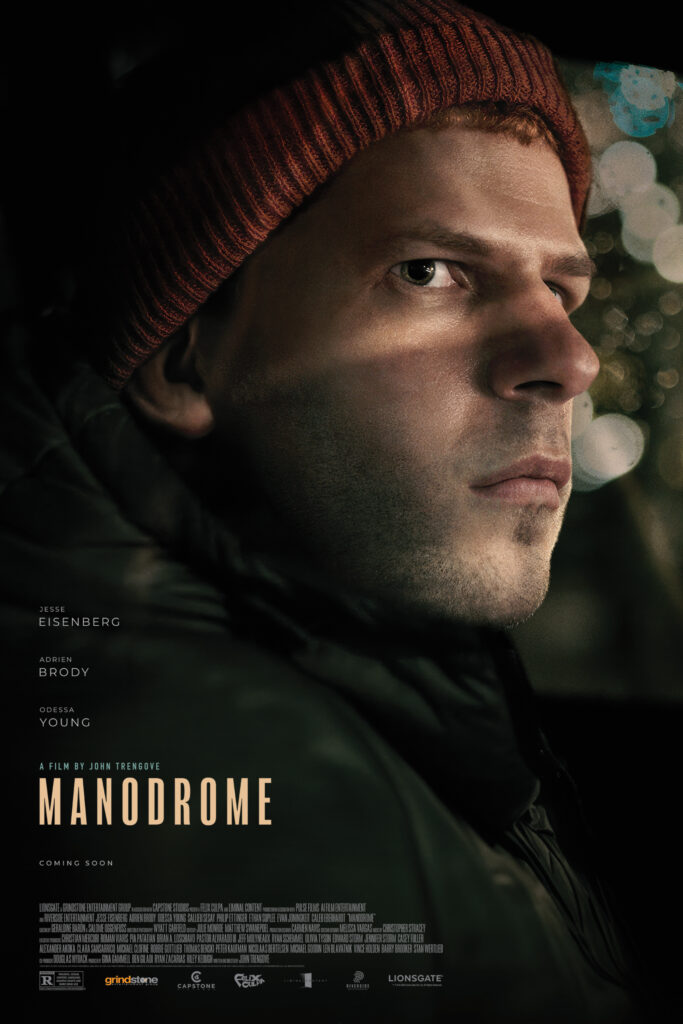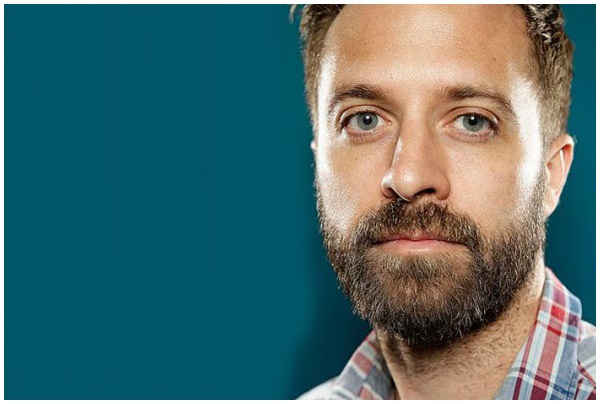Manodrome is the new thriller from director John Trengove. It tells the story of Ralphie (Academy Award® nominee Jesse Eisenberg) a man who is wrestling with outside forces and the demons within when he meets a mysterious family of men who welcome him as one of their own. As Ralphie struggles to define himself, pressure mounts and a powder keg is lit that will blow a hole in the lives of everyone he touches. Joining Eisenberg is an all-star cast including Academy Award® winner Adrien Brody and the unforgettable Odessa Young. Experience a thrilling film about one man’s discovery that there is nowhere to hide from yourself.
John stopped by to chat with us about the film.
I was reading that Angela Nagel’s book, Kill All Normies, was kind of an inspiration for your latest picture Manodrome. But for those who don’t know can you tell us a little bit about how you came up with the story for Manodrome?
Yeah, I think it started with this book. It’s a book about many, many different things, but essentially led up to the election of Trump. It’s weird to talk about it now. At the time, I was like so many people. I was just trying to understand why the world was going crazy, where all this madness was coming from. It was such a moment where you wake up one day, you’re like, “what is going on?” because everybody kind of lost their minds.
It was a book that was very useful at that time to get this broader understanding of what had been going on in the world and what had preceded a lot of the geopolitics that we see today. But anyway, there’s one chapter in the book. It’s just one chapter. She talks about many things about the manosphere and at that time, I’d never heard about the manosphere. Today, it’s much more widely understood but I was completely transfixed. It was a little bit of a dilemma because I was really interested in this subject matter and what it was about and what it could be in a kind of fictional context. But I was also quite adamant that I didn’t want to make a film about Internet trolls or Internet culture, that I needed to sort of pull it away a little bit and find some other way of articulating these things that I was interested in. Kind of wrestling with it a little bit.
It occurred to me, what if you take it off the Internet and bring it into this idea of the chosen family? Which as a gay man, it’s something I’m quite familiar with. It’s this idea of people who come from problematic backgrounds, from toxic relationships, who sort of come together in communities and form these chosen families. That’s actually something that speaks in the film. Other people don’t get to choose their families, but we do. So, it was that thing of like, “you know, what? If we kind of bring these two people together, can I imagine a culture forming and these rituals forming?” and it all just sort of flowed from there. I mean, there were other references as well, but it was really an amalgamation of a bunch of things. And then Ralphie at the centre of it, I’ve just always been fascinated by the violence that can stem from repression. When somebody is so much in denial of what they are or when they’re trying to resist a part of themselves, of something like their sexuality, that can often be the catalyst for more violence. So,then it became this thing where you invent this world of men and then you bring this problematic character into this world and watch things ignite. So, yeah, I mean, as with anything that you write you kind of mull around these same ideas for a while until something starts rationalising.
What’s interesting about Ralphie, is that he’s the protagonist, but he is also arguably the antagonist at the same time, which is an interesting idea. How challenging is it to keep the audience engaged with someone who isn’t particularly appealing as a person?
Yeah, that’s a very good question. I mean, I suppose the film isn’t for everybody but, it was this kind of balancing act. Well, firstly, to say that you’re absolutely right, I was writing this kind of person that I would consciously avoid in real life, like if I was walking on the street, I would cross to the other side. I was interested in that feeling inside myself and if I could empathically project myself into that and begin to imagine what his life is like and how he functions and how he thinks. So, from the beginning, it was this idea of a problematic person and then to bring the audience into a kind of a close relationship with him, but also not letting us understand everything about him. You get a sense that there’s this kind of internal pressure building, and you get these glimpses of what that might be about. You see him grappling with his humanity a little bit and you see the external pressures that are acting on his life. It’s this feeling of being close to somebody, but also not quite knowing them and the uncomfortable relationship that you set up there. Then just in this little vehicle on a collision course, that was the sort of design of the film. I guess from an audience perspective, there’s a limit to how far you push the audience down that road. And the film is deliberately quite blunt and to the point and it drives you to the end quite quickly because I think probably, you’d go mad in a long, drawn-out story about Ralphie. In a way, it needed to be the sort of bullet train.
I thought Jesse Eisenberg was just perfect as Ralphie. What was it about him that made him so right for this character?
Well, he read the scripts and he responded immediately. It was a very exciting first conversation that we had. I think in a way, he shares a lot of my feelings of apprehension and terror around hypermasculine culture and similar fascinations. I guess as a phenomenal actor, the opportunity to project yourself into something that feels far from your own experience is very exciting or it is for somebody like him and fortunately he just has the kind of talent and the resources to pull it off. I feel, what he really, really articulates about the character is this idea that Ralphie is trying to be something that he’s not, desperately trying to turn himself into an abstract idea of a man. He’s so lost and so disconnected from himself that he doesn’t even quite understand what it is that he’s trying to do. But that failure and that softness of the character is something that he just brings to it and it’s devastating. I agree it’s a very, very interesting performance. Working with Jesse what surprised me is that he’s a very intelligent guy and he thinks and analyses things very intensely. But when he came on to set, he worked with an intuition that he was interested in not knowing and just responding to things in the moment. So, there’s a strangeness and an unpredictability about the performance that I think comes from that.

Did he like to bring his own ideas to the character and how he looks with the red hair?
Yes, the hair was a reference to The Man Who Fell to Earth. It’s an old favourite of mine. David Bowie plays this alien, and he has this kind of intense red hair. There was something about this character with this intense kind of colour, just occupying every frame that’s just very beautiful and very effective, so we decided to do it. It’s a tribute to Mr. Roeg’s film.
I thought of the score by Christopher Stracey was wonderfully unsettling, which perfectly encapsulated the constant conflict going on inside of Ralphie. Can you talks us through creating that sound for the film with Christopher?
Yeah. I mean, firstly, I just couldn’t agree more. I’ve never had such an exciting and effective collaboration with a musician. Chris was just the perfect guy who landed in the perfect place. I mean, I just feel so lucky to have had this fortuitous collaboration. But yeah, I think we listened to a bunch of different things, but really, he’s got this great studio set up and he just started playing with different sounds while we were talking about scenes and he’d pull out a violin bow and just sort of create sounds. It was a very intuitive conversation. There wasn’t so much strategic thinking behind the score as it was just kind of looking for a certain quality that made sense. The music in the film is incredible. I’m so, so proud of him and I agree with you, I think it’s really, really special. It really takes the film to another place.
Were there any scenes that you had to remove from the film which you regret, or is the final film exactly the way you envisioned?
Oh, there’s so much that that we cut. Yeah, I think going back to what I was saying earlier this intention of just driving the story through, not stopping for a breath, not taking time to branch out that became this sort of ethos in the editing room. And unfortunately, in the process, you lose a lot of babies or darlings. Yeah, it’s painful, but it’s part of the process. I do believe you have to make these sacrifices to get to the essence of something and yeah sadly, there were many scenes that were cut.
What conversations do you hope the film might start or contribute to with audiences?
I hope that someday that the film lands slightly differently in everybody. There’s no one idea that I want to impart but I think what was very much driving my own inspiration is this idea of the man-child being a man but feeling like a baby. That’s something that I have. I think it’s kind of a universal thing. I think it’s endemic of where we find ourselves today with men perhaps sometimes being under resourced when it comes to dealing with emotions and how that can lead to violence and all sorts of other problems. So, it’s that idea of a character who’s trying to be a dad but also needs a daddy and the dichotomy of that, the madness of that that I think is at the heart of the film.
Thanks so much for taking the time to chat with me and all the best with the film.
It was lovely to talk to you. Thanks so much.
Manodrome Hits Theaters November 10, 2023 and On Demand and Digital November 17, 2023


